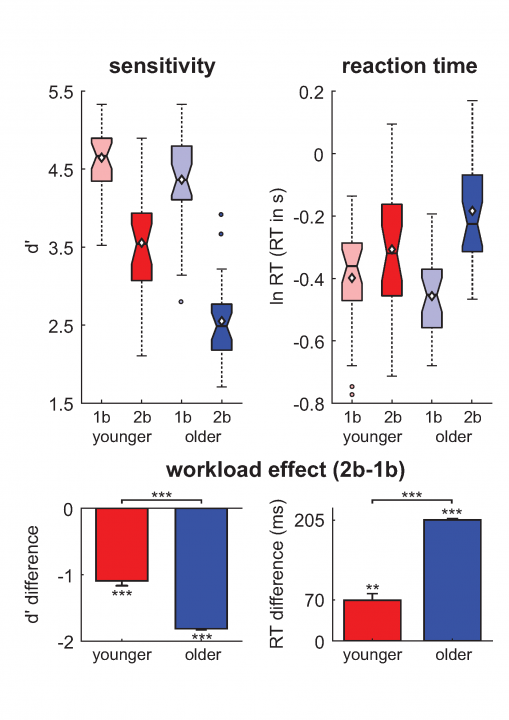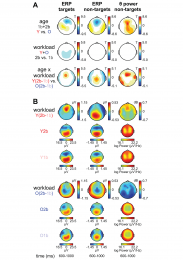The paper entitled Altered event-related potentials and theta oscillations index auditory working memory deficits in healthy aging, by, Nowak, K., Costa-Faidella, J., Dacewicz, A., Escera, C., and Szelag, E., has been published in the journal Neurobiology of Aging.
This paper is the outcome of a scientific collaboration between the Brainlab and the Laboratory of Neuropsychology, led by Prof. Elzbieta Szelag at the Polish Academy of Sciences (Poland), to investigate auditory working memory load effects in healthy aging.

A challenging issue for many older individuals that, in severe cases, may lead to social isolation, is to face daily-live conversations while experiencing speech comprehension deficits. Whilst impoverished hearing acuity is obviously a contributing factor, recent research is showing that a decline in working memory may be the main underlying cause. Surprisingly, however, most studies investigating the effects of healthy aging in working memory focused in the visual domain. Since conversation requires a set of functions related to information processing within and outside the focus of attention, such as constant monitoring, updating, selection and retrieval, delineating a comprehensive account of the effects of auditory workload during tasks involving continuous information processing proves essential. In our work, we used state-of-the-art data driven analyses and brain-behavior correlations on event-related potentials and oscillatory activity extracted from the electroencephalogram (EEG) of younger and older participants who performed an auditory version of the n-back task using speech syllables. Our results suggest that healthy aging entails functional alterations in a cascade of auditory information processing stages, from sensory gating to cognitive resource allocation during constant information updating.

The full abstract reads as follows:
Speech comprehension deficits constitute a major issue for an increasingly aged population, as they may lead older individuals to social isolation. Since conversation requires constant monitoring, updating and selecting information, auditory working memory decline, rather than impoverished hearing acuity, has been suggested a core factor. However, in stark contrast to the visual domain, the neurophysiological mechanisms underlying auditory working memory deficits in healthy aging remain poorly understood, especially those related to on-the-fly information processing under increasing load. Therefore, we investigated the behavioral costs and electrophysiological differences associated with healthy aging and working memory load during continuous auditory processing. We recorded EEG activity from 27 younger (∼25 years) and 29 older (∼70 years) participants during their performance on an auditory version of the n-back task with speech syllables and 2 workload levels (1-back; 2-back). Behavioral measures were analyzed as indices of function; event-related potentials as proxies for sensory and cognitive processes; and theta oscillatory power as a reflection of memory and central executive function. Our results show age-related differences in auditory information processing within a latency range that is consistent with a series of impaired functions, from sensory gating to cognitive resource allocation during constant information updating, especially under high load.
Reference:
Nowak, K., Costa-Faidella, J., Dacewicz, A., Escera, C., & Szelag, E. (2021). Altered event-related potentials and theta oscillations index auditory working memory deficits in healthy aging. Neurobiology of aging, 108, 1–15.
Permanent doi: https://doi.org/10.1016/j.neurobiolaging.2021.07.019.

